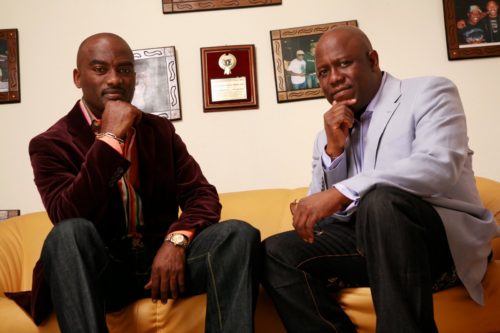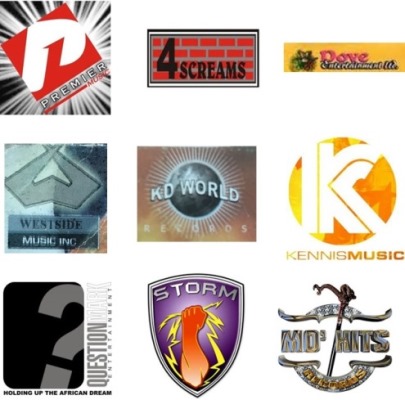Words by Ehis “Combs” Ohunyon
A few days ago on Twitter, there was this dialogue on the timeline about some of the music we used to listen to and the labels that birthed them.
When the new wave of Afropop took over the scene in the late 90’s, we had ‘major’ indigenous labels like Kennis Music, Storm Records, Nelson Brown’s Dove Records leading the path for others to follow. Kennis Music, led by the duo of Kenny Ogungbe and Dayo Adeneye, was the powerhouse label who redefined the industry. Armed with the likes of The Remedies, Paul Play Dairo, Kenny St. Brown, Azadus, KC Presh and 2Face Idibia, and backed by heavy PR machinery and media presence, this was the place that every upcoming artist who wished to make it big in his career wanted to be.

Dayo ‘D1’ Adeneye and Kenny ‘Keke’ Ogungbe
Along the lines came the likes of Storm Records in 2004 headed by the dynamic Obi Asika. Like a storm they did sweep the scene, putting out quality videos and signing the likes of Darey, Sasha, Ikechukwu, GT tha Guitarman, Naeto C, Jazzman Olofin. Storm was one of the well-structured labels in the nation at that point. These labels played a significant role in ensuring the growth of the music industry and improving the career of artists.
The dream of every artist used to be getting signed to a major label, getting that deal that ensured you didn’t have to worry about the funds for your studio sessions, promotions, video shoots, a platform that basically made everything easy for you to just focus on making good music. I remember walking into the Ikeja office of Mike Records in the mid 2000s, a label that emerged with so much buzz and paraded the likes of Freewindz and the Mamuzee Twins at some point. They had requested that upcoming artists submit their demos for an opportunity to get signed on the label. Over 200 tapes were submitted, artists hung around the studio hoping to catch the attention of the executives or a member of their A&R, the place was a beehive of visit, far beyond the expectation of the label.
Fast forward to 2017 and things have taken a different turn. Aside the fact that the power labels all seem to have faded away – Storm Records battling in-house crisis and evolving overtime, Kennis Music with only Joel Amadi on its platform to boast of, Now Muzik becoming a forgotten name, Question Mark involved in one too many controversies, Little Fish not becoming the big whale after all and Grafton Records relegated to the background of history – a wave has swept the scene and that dream of a major deal has given way to new realities.
Aside maybe signing international deals, which are coming in their droves now with the likes of Wizkid, Davido and Runtown all getting a piece of the pie, the truth is with worldwide album sales plummeting and illegal downloads prevailing, record labels no longer make profits off their investments. More so, conflicts between labels and their acts as witnessed with Brymo and Chocolate City, Kelly Hansome and Kennis Music, HarrySong and Q-Mark and now FiveStar Music, Eva Alordiah and Trybe Records have all diminished the lure it once had.
So what are the alternatives? The world has evolved and so has the Nigerian music scene. The trend is the rise of independent labels usually set up and owned by one man who has some cash or an A-list artist riding on the wave of his stardom and brand. On most occasions, they go on to sign just one artist and backed with a healthy but reasonable budget, fund the artist. Depending on the success of said artist, then they go ahead to expand the family. Since these labels practically cater for the artist’s studio sessions, video shoots, promotions and everything required in making him a household name, indie labels embrace the 360 deal as a way to recoup their investments.
Artists are taking over from executives! Wizkid left EME and set up Star Boy Records, and has amassed a team, including 2016’s breakout star Mr. Eazi. Olamide’s YBNL introduced us to Lil Kesh who has gone onto Yagi Records, Wande Coal departed from Mavin and now heads Black Diamond Records, the list is endless and many more are set to toe this line.

Mr. Eazi, Wizkid
Social media has also played a huge factor as these indie labels all fully utilize the opportunities provided by platforms like Twitter, Instagram and Snapchat in connecting with their fans and with the introduction of the likes of iTunes, Spotify and SoundCloud, getting music out is no longer as difficult as it used to be, so the funds benchmarked by a major label for promotion via radio and TV channels are usually not required on a huge scale at first.
Let’s be clear labels, whether major or indie, are not charity concerns and are only in the business to make profit. But where with the major labels, royalties are largely shared and only paid upon successful returns, with the label retaining copyright and publishing rights, the indie labels allow their artistes to own the rights to their music. Major labels also create a timeline that may delay the growth of an artist. Artists, despite recording a full body of work, have to wait their turn before their work can be released. This, at times, kills the buzz that’s built – independent labels are more flexible in this regard.
This is the reality, a Poe getting signed to Mavin brought so much cheer as fans see this as a step up and an opportunity for their favorite lyricist to get the shine his skill deserves but also a Wizkid and Skales leaving EME has created a spring for bigger opportunities for them as they are able to handle their businesses more directly which makes the pace for successful negotiations faster. Following the Olamide model in giving his acts a ‘2 years’ deals, which may not entirely be a wise decision, it further highlights the fact that labels are important but their monopoly as a determinant to career success is far gone.
Attaining success in the industry is no longer tied to that deal from any label, major or otherwise, but rather by understanding the dynamics of the music industry, perfecting your craft and a flexible ability to blend with the ever-changing industry trends. So for upcoming artists, a deal remains a great idea but even without a major record label, the path to stardom may not be easy but is very attainable.
Ehis “Combs” Ohunyon is a Lagos-based realtor, asset valuer and writer


